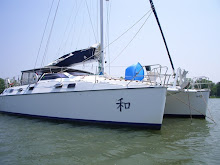It has been one stinking summer. I have spent most of it sleeping with very little energy. I think this email from Florrie says it all.
Yesterday we went to Dr. E, the eye doctor who did the original cataract surgery. It is the first time he's seen Lew since the ER on July 16th. He said that Lew's eye is looking really good and he scheduled tentative dates when Lew can have the last surgery. Actually there will be a second one to take out the stitches. Now we have to wait for Dr. U, the retinologist, to say it is ok. Lew sees him on Monday. It looks like Lew will have the last surgery on either the 9th or the 16th of Sept. That is the good news.
The not-so-good news is that, because the third surgery is more invasive than the others (thanks to "issues" with Lew's eye), it will take ANOTHER 8 weeks to heal! That means we won't be able to move the boat south before November 4th at the earliest. I can't begin to list the ways this scrambles our "plans" for the fall. All we can do is take one little step at a time, fixing what doesn't require lifting of anything more than 30 lbs. We may be going down the ICW in the cold, behind the boaters' "migration" that will start from Norfolk on Nov 4th or so.
By the way - Lew's right eye also needs cataract surgery! But we can't do anything about that until this one is all healed, of course!
This has NOT been the summer we planned!!!! >:{
Hugs,
Florrie
Hotmail® is up to 70% faster. Now good news travels really fast. Try it now.

